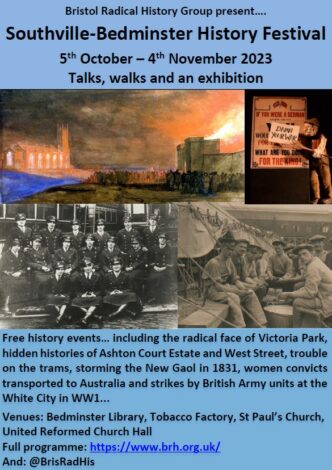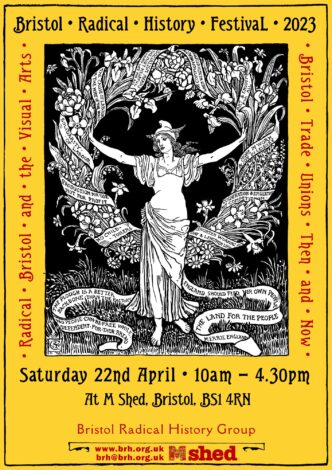Join us for an evening of performance and lively discussion connected to the recently published book Haunting Ashton Court: A Creative Handbook for Collective History-Making, inspired by a community youth theatre project that took place at the mansion across Winter 2022. The evening will include performances from a company of young Bristolians responding to the gaps and silences in the official archives of Ashton Court Estate, followed by a panel Q&A with the young people involved, chaired […]
A walking tour as part of Bristol Radical History Festival Meet at the MShed front entrance at 4.00pm. Finish at the Louisiana around 5:30pm. Bristol’s city centre has been a focus for squatters making a political point: on housing need and homelessness, in solidarity with strikes, in solidarity with land struggles and in defence of the natural environment. This short tour includes five buildings squatted in the Harbourside, Old Town and Redcliffe in the 1970s, 1980s, 1990s, 2000s and […]
This panel considers the work of contemporary artists who have had an influence and impact on Bristol but sought little exposure for themselves. Two artists who have recently passed away, Steve Philbey and Tony Forbes, certainly fit the bill, as do the activities of the Bristol Refugee Artists Collective. Steve Philbey (1943 - 2022) was a painter, muralist, graphic artist, photographer and founder/chronicler of The Saint-Just Mob. And also variously a factory worker, Father Christmas, painter […]
100 Years of Struggle (30 mins) is a film made in 1973 to mark the centenary of the Bristol Trades Union Council. Although it was transmitted by BBC Bristol, it was produced and narrated by members of the Council. Each of them linked key events in the past - in 1873, 1892, 1914 and 1926 - to the industrial and political struggles of the time when the documentary was made.
Sheila Caffrey will talk about some of the picket lines and broader campaigns seen in Bristol in the last couple of years, and some of the bigger protests and how these have also affected the mood e.g. Black Lives Matter and COP-26, and the role Trades Unions have (or could have!) played in these. Sheila Caffrey is an active trade unionist in Bristol. She first got involved with Bristol Trades Council 15 years ago, after becoming a teacher and a campaigner in the National Union of Teachers […]
Andy Danford brings to life his experience as a worker and senior union representative in Bristol’s arms industry during the 1970s and 1980s. During these two decades, life on the shop and office floors, and the strength of workplace trade unionism, shifted dramatically, as the advent of Thatcherism marked the beginning of the sustained attack on worker and union rights which extends to this day. Against this background of change, Andy provides a rich account of the actions of rank-and-file […]
Art and Labour William Morris (1834-1896) was, and is, one of England’s most famous nineteenth-century socialists. On the 3rd March 1885, the famous Victorian designer came to Bristol to deliver a talk on “Art and Labour,” at the Museum and Art Gallery. Addressed particularly to the workers of the city, the event was sponsored by the Bristol Branch of the Socialist League. His words as an artist and thinker could not have been more relevant at a time when the British Empire was on the ascendent, […]
What is the connection between the Bristol Sharples family of artists, the American Revolution of the 1780s and the Royal West of England Academy of Art? Join Lee Cox in exploring the places where Ellen and Rolinda Sharples lived and worked at the beginning of the 19th century. Rolinda became the only female member of the Bristol School of Narrative Artists, whilst the Sharples family little known legacy led to the establishment of equal art training opportunities for women alongside men […]
Twentieth century artist Doris Hatt (1890-1969) was a woman ahead of her time. She was a feminist and socialist, and a pioneer of modernism in Britain, but her life and work have been under-appreciated until the last few years. Doris Hatt was born in Bath, but after World War I she moved to Clevedon with her mother, where they established their home, Littlemead. When her mother died in 1929 Doris’s partner Margery Mack Smith, a school teacher and weaver, came to live with Doris, beginning a 40 […]
The Bristol Tramways Lock-Out, 1901 - Rob Whitfield In the summer of 1901 the Bristol Tramways Company sacked 90 employees who had recently joined the Gasworkers’ and General Labourers’ Union. Another 300 tramways employees went on strike in support of their dismissed fellow workers. This action by the Tramways Company was a direct challenge to the trade union movement in Bristol and beyond, and the wider labour movement rallied in support of the tramwaymen. The company threw all the resources […]

